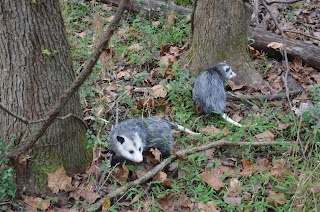Wildlife Release at Leigh Farm Park
Durham Parks and Recreation (DPR) recently collaborated with a licensed wildlife rehabilitator to provide a safe home for orphaned opossums. Wildlife Welfare Inc., is a nonprofit 501C organization that trains, mentors, and helps with supplies for dozens of rehabbers throughout the area with the desire to 'give wildlife a second chance'. Two baby opossums, Thomas and Valerie, were released on Tuesday, October 20, 2020, into one of Durham's parks. Volunteers from Wildlife Welfare Inc. assisted the opossums in the transition. Upon their release, the opossums seemed very relaxed, curious, and comfortable in their new home at the park.
Opossums are a natural part of the urban landscape, and are common throughout the state, including in North Carolina’s biggest cities. In general, wildlife should not be captured and released away from where they were found unless done so by a licensed wildlife rehabilitator. The catch and release of wildlife can be harmful to the animals, spread disease, create the potential for human-wildlife conflicts, and in most cases, it is actually against the law. DPR worked closely with Wildlife Welfare Inc., to support this special release for these baby opossums.
Did you know?
- Opossums provide natural and free pest control. They can eat thousands of ticks per week (reducing the spread of tick-borne diseases like Lyme’s disease), and also eat cockroaches, slugs, rats, and snakes.
- Opossums are practically immune to rabies and are not dangerous to people or pets.
- Fossil records show that possums have been around since the Upper Cretaceous Period (65 million years ago) and lived with the dinosaurs! Their life span today is only 1-3 years in the wild.
- Opossums will den nearly anywhere that is dry, sheltered and safe. They do not dig their own dens, but rather use burrows dug by other mammals, rock crevices, hollow stumps, wood piles and spaces under buildings.
Orphaned/Injured Wildlife
If you come across orphaned or injured wildlife, be sure to reach out to a licensed wildlife rehabilitator.
For more additional information, check out these resources:
- NCWRC opossum information page (webpage)
- NCWRC opossum profile (pdf handout)

Comments
Post a Comment